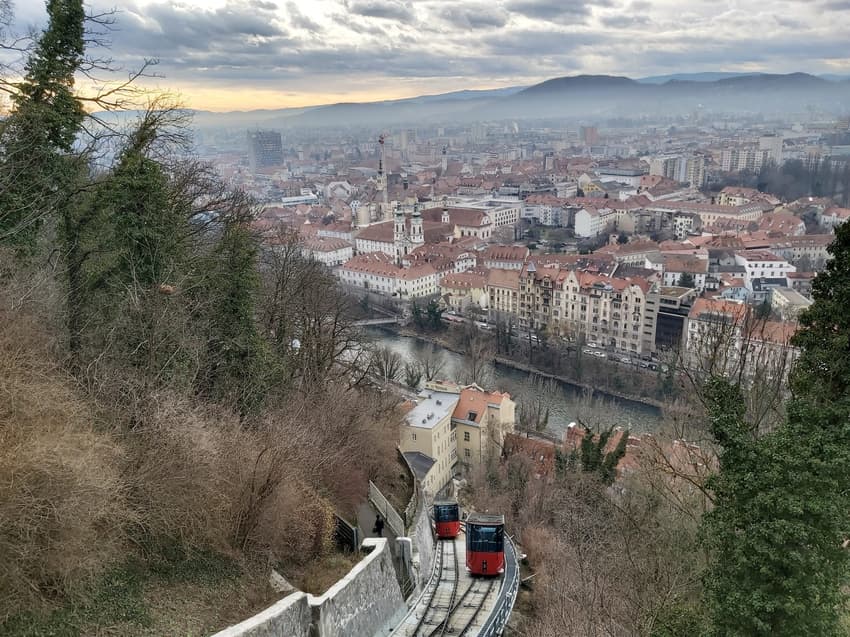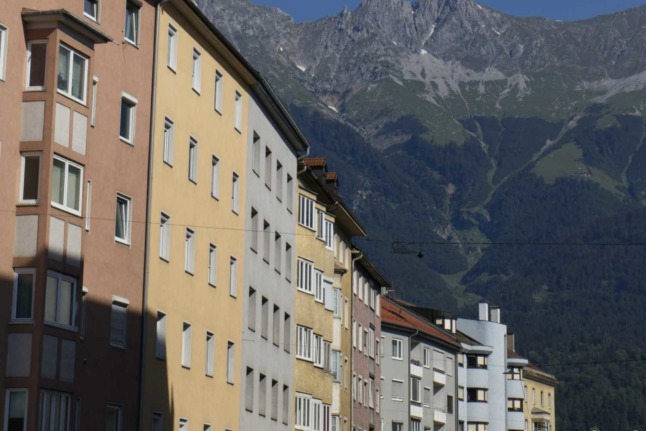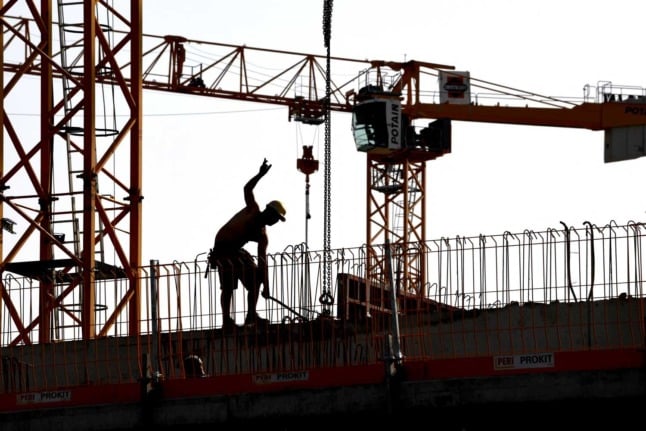EXPLAINED: Why is the housing market in Austria so dire right now?

Finding a job or getting a visa in Austria may well be easier in some places than finding a place to live – and what is available will often stretch the limits of one’s bank account. Just how did it get so bad?
Looking to move? Find your next rental apartment here.
Whether it’s rent spikes, unaffordable listings, or simply struggling to find a place to live – Austria’s housing crisis is putting its fair share of people under financial stress, whether they rent a place already or are looking for one to buy or rent.
In Salzburg, one of the country’s worst hit cities, residents are spending an average of 44 percent of their income on rent – up from an already high 36 percent in 2018.
Buying there is hardly a better option, with new listings in places like Salzburg going for over €10,000 per square foot. That’s over €600,000 for a 60 square metre flat or over €1 million for the 100 square metres a family might need.
Experts say there’s no one single reason for how Austrian housing got so bad. Rather, there’s a cocktail of different factors all coming together to put increasing price and supply pressure on renters and buyers – especially those moving to Austria for the first time. Here’s a few of the main ones.
READ ALSO: EXPLAINED: Why is finding housing in Salzburg so difficult?
Hoarding and vacancies
The equivalent of around ten hectares of land is sold in Austria every single day.
Yet not all of this is turned over to be used for anything. Some people will hang on to certain lots neighbouring their homes – even when they have no intention of using them for much of anything – because they don’t want to see property next to their own developed.
Others will hold onto the land for their children and grandchildren to pass it on to them later.

Austria's property market has been booming for two years, but there are signs that demand is decreasing. Some of this is down to hoarding. (Photo by Anna Rosar on Unsplash)
Vacancy is another issue. Wealthy oligarchs from authoritarian countries such as China and Russia are known to purchase property in democratic Western countries – including Austria – as a way to park money in an investment that their home regimes cannot easily confiscate if they’re arrested or their assets in their home countries are seized.
These properties often aren’t even used as second homes – although some municipalities also restrict those. They simply remain vacant instead of being rented out – pushing down the overall supply of housing.
READ ALSO: EXPLAINED: Property buying rules for international residents in Austria
How many properties does this apply to? It’s actually very hard to say. Not every home that sits unoccupied for parts of the year is technically vacant. It may be a second home or even the primary residence of pensioners who spend a large part of their year in other countries with milder weather, for example.
Not every home that uses tiny amounts of electricity is vacant either. Some people are simply very careful about how much they use or have energy-efficient materials.

Austria's property market has been booming for two years, but there are signs that demand is decreasing. (Photo by Jacek Dylag on Unsplash)
All this makes it very hard to even determine how many properties are technically vacant, making a vacancy survey very meticulous and time-consuming work. Vienna last did one such survey about ten years ago. At the time, it found that about 2.5 percent of homes in the capital were vacant – some 10,000 homes.
Innsbruck is the only Austrian city to have done a vacancy survey recently, and work on it is still ongoing. That survey found that a staggering nine percent of homes in the Tyrolean capital are currently vacant.
READ ALSO: What’s changing for tenants and homeowners in Austria in 2023?
Not enough building and high building costs
Austrian governments, whether at the state or federal level, are regularly missing their housing targets, in some cases by as much as forty percent in places like Salzburg.
In Vienna, around 16,000 homes were completed last year, dropping to an estimated 12,000 next year and 7,500 in 2025 – not nearly enough to keep up with the city’s population growth.

New construction in Austria is falling due to rising building material costs. Photo:HARALD SCHNEIDER / APA / AFP
A big reason for this is the increasing cost of building materials, which are rising sharply amidst higher inflation and cost of living. Construction wages are also rising by around nine percent, partly due to cost of living and partly due to Austria’s current shortage of skilled labour.
At the same time, most housing in Austria is completed by private developers selling to private investors rather than non-profits or state agencies. Part of this is down to earmarks for social housing, which were abolished in Austria in 2008. In early 2023, Chancellor Karl Nehammer reinstated this – with non-profit cooperatives calling for housing subsidies to go up to one percent of GDP, up from its current 0.4 percent.
Tenancy laws and state housing that protect insiders
Vienna in particular is famous for its affordable state-run housing scheme, which sees its fair share of 100 square metre apartments made available for affordable rates of €700 or so.

Vienna is considered a renter's paradise in some circles - but it favours insiders. Photo by Manel & Sean on Unsplash
The catch here is that you need to have been a resident of Vienna for two years already. You also need to be an Austrian citizen or “equivalent” – which means having EU/EEA citizenship or permanent residency in Austria. That locks out a lot of people moving to Austria for the first time – or even people who have lived in the country for years but who then move to Vienna specifically.
READ ALSO: Renting in Austria: When can my landlord increase the rent, and by how much?
Old, permanent rental contracts also see tenants that have been in their homes for a long time pay significantly less than newer tenants, who may be renting an even smaller property.
Some of these old rental contracts are even passed down through the generations, turning old permanent rental contracts into de facto housing assets.
Comments
See Also
Whether it’s rent spikes, unaffordable listings, or simply struggling to find a place to live – Austria’s housing crisis is putting its fair share of people under financial stress, whether they rent a place already or are looking for one to buy or rent.
In Salzburg, one of the country’s worst hit cities, residents are spending an average of 44 percent of their income on rent – up from an already high 36 percent in 2018.
Buying there is hardly a better option, with new listings in places like Salzburg going for over €10,000 per square foot. That’s over €600,000 for a 60 square metre flat or over €1 million for the 100 square metres a family might need.
Experts say there’s no one single reason for how Austrian housing got so bad. Rather, there’s a cocktail of different factors all coming together to put increasing price and supply pressure on renters and buyers – especially those moving to Austria for the first time. Here’s a few of the main ones.
READ ALSO: EXPLAINED: Why is finding housing in Salzburg so difficult?
Hoarding and vacancies
The equivalent of around ten hectares of land is sold in Austria every single day.
Yet not all of this is turned over to be used for anything. Some people will hang on to certain lots neighbouring their homes – even when they have no intention of using them for much of anything – because they don’t want to see property next to their own developed.
Others will hold onto the land for their children and grandchildren to pass it on to them later.

Vacancy is another issue. Wealthy oligarchs from authoritarian countries such as China and Russia are known to purchase property in democratic Western countries – including Austria – as a way to park money in an investment that their home regimes cannot easily confiscate if they’re arrested or their assets in their home countries are seized.
These properties often aren’t even used as second homes – although some municipalities also restrict those. They simply remain vacant instead of being rented out – pushing down the overall supply of housing.
READ ALSO: EXPLAINED: Property buying rules for international residents in Austria
How many properties does this apply to? It’s actually very hard to say. Not every home that sits unoccupied for parts of the year is technically vacant. It may be a second home or even the primary residence of pensioners who spend a large part of their year in other countries with milder weather, for example.
Not every home that uses tiny amounts of electricity is vacant either. Some people are simply very careful about how much they use or have energy-efficient materials.

All this makes it very hard to even determine how many properties are technically vacant, making a vacancy survey very meticulous and time-consuming work. Vienna last did one such survey about ten years ago. At the time, it found that about 2.5 percent of homes in the capital were vacant – some 10,000 homes.
Innsbruck is the only Austrian city to have done a vacancy survey recently, and work on it is still ongoing. That survey found that a staggering nine percent of homes in the Tyrolean capital are currently vacant.
READ ALSO: What’s changing for tenants and homeowners in Austria in 2023?
Not enough building and high building costs
Austrian governments, whether at the state or federal level, are regularly missing their housing targets, in some cases by as much as forty percent in places like Salzburg.
In Vienna, around 16,000 homes were completed last year, dropping to an estimated 12,000 next year and 7,500 in 2025 – not nearly enough to keep up with the city’s population growth.

A big reason for this is the increasing cost of building materials, which are rising sharply amidst higher inflation and cost of living. Construction wages are also rising by around nine percent, partly due to cost of living and partly due to Austria’s current shortage of skilled labour.
At the same time, most housing in Austria is completed by private developers selling to private investors rather than non-profits or state agencies. Part of this is down to earmarks for social housing, which were abolished in Austria in 2008. In early 2023, Chancellor Karl Nehammer reinstated this – with non-profit cooperatives calling for housing subsidies to go up to one percent of GDP, up from its current 0.4 percent.
Tenancy laws and state housing that protect insiders
Vienna in particular is famous for its affordable state-run housing scheme, which sees its fair share of 100 square metre apartments made available for affordable rates of €700 or so.

The catch here is that you need to have been a resident of Vienna for two years already. You also need to be an Austrian citizen or “equivalent” – which means having EU/EEA citizenship or permanent residency in Austria. That locks out a lot of people moving to Austria for the first time – or even people who have lived in the country for years but who then move to Vienna specifically.
READ ALSO: Renting in Austria: When can my landlord increase the rent, and by how much?
Old, permanent rental contracts also see tenants that have been in their homes for a long time pay significantly less than newer tenants, who may be renting an even smaller property.
Some of these old rental contracts are even passed down through the generations, turning old permanent rental contracts into de facto housing assets.
Join the conversation in our comments section below. Share your own views and experience and if you have a question or suggestion for our journalists then email us at [email protected].
Please keep comments civil, constructive and on topic – and make sure to read our terms of use before getting involved.
Please log in here to leave a comment.